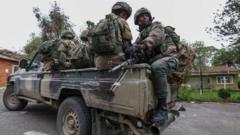A comprehensive review of Israeli intelligence tactics sheds light on the targeted operations against Hezbollah's leadership, encapsulating decades of meticulous espionage that culminated in a dramatic military strike.
### Unveiling Israeli Intelligence: The Fall of Hezbollah's Leadership

### Unveiling Israeli Intelligence: The Fall of Hezbollah's Leadership
In-depth investigation reveals Israel's tactical operations leading to the assassination of Hassan Nasrallah.
In a fateful turn of events on September 27, Hassan Nasrallah, the head of Hezbollah, dismissed concerns about his safety as Israeli intelligence closed in. Bellying his belief, he remained deep underground in a fortified bunker while Israeli spy agencies meticulously documented his movements over several years. Despite his convictions that Israel would refrain from eliminating him, F-15 jets unleashed a devastating assault, erasing his hideaway and taking his life.
The subsequent bombing revealed the shocking level of penetration Israeli intelligence had achieved within Hezbollah. Ensuing reports depicted how Israeli operatives had meticulously tracked the group's leaders, utilizing an array of covert methods, from implanting listening devices in strategic locations to intercepting intimate rendezvous.
The military operation aimed not only at neutralizing Nasrallah but sought to dismantle the entire organizational structure of Hezbollah, which included the targeting of missile caches capable of launching attacks against Israel. Detailed intelligence gathered through persistent observation and unconventional tactics set the stage for what would be a historic confrontation between Israel and the Lebanese militia.
Reportedly, the meticulous operation that brought down Hezbollah’s notoriously feared leader stemmed from decades of groundwork laid by Israeli spies who navigated the complex world of espionage and military strategy. Interviews with former officials illustrated a profound understanding of Hezbollah’s intricate internal dynamics, suggesting that Israel's intelligence apparatus had achieved an unprecedented level of clarity on the group's operations.
In the wake of Nasrallah's assassination, experts say the impact could reverberate throughout the region, potentially affecting geopolitical alliances and the balance of power within Lebanon itself. As tensions rise and the dust settles, many are left to ponder what this significant institutional loss entails not just for Hezbollah's future but for ongoing Middle Eastern geopolitics.






















